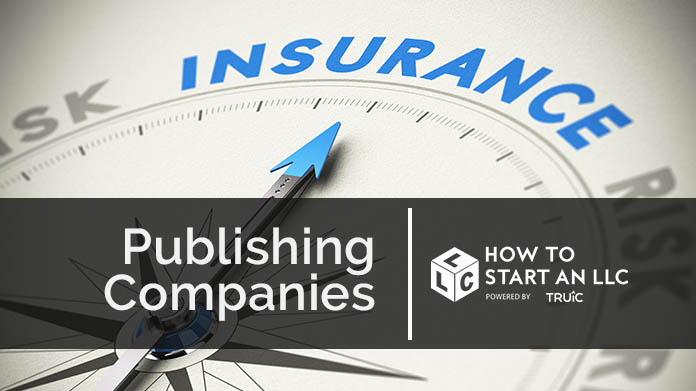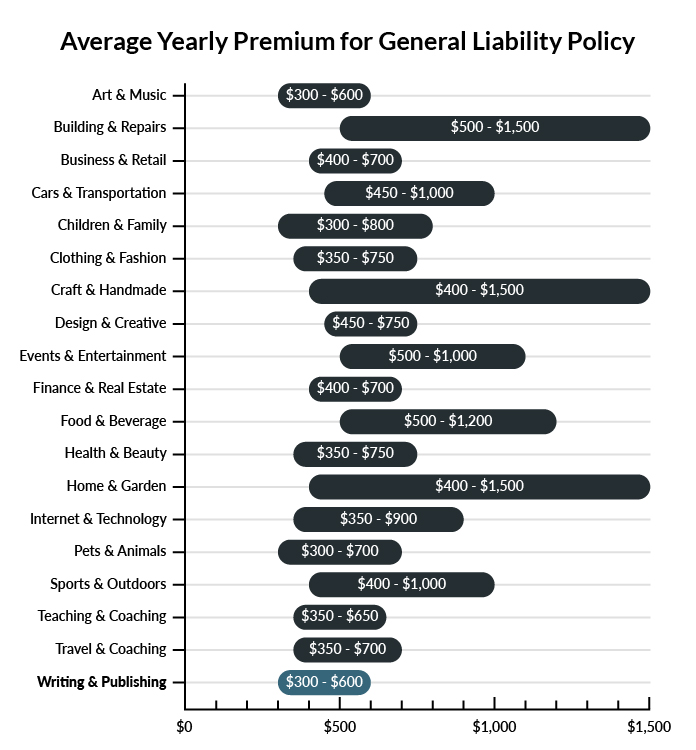Publishing Company Insurance
Getting insurance for your publishing company is essential.
Publishing companies need to be protected against claims of things like copyright infringement, defamation, and disputes surrounding royalties.
For example, an author claims you paid them the incorrect amount in royalties, or you use an author’s content for marketing without permission.
We’ll help you find the most personalized and affordable coverage for your unique business.

Recommended: Ergo Next Insurance is dedicated to matching small businesses with the right policy at the best price.
Best Insurance for a Publishing Company
General liability insurance is — generally speaking — one of the most important insurance policies for publishing companies.
Some of the risks general liability insurance covers are:
- Bodily injury
- Property damage
- Medical payments
- Legal defense and judgment
- Personal and advertising injury
Some other policies that may also be beneficial to your publishing company include:
- Product liability insurance: If any individual decides to file suit against your company for injuries they claim were caused by your products, this policy would cover any associated legal fees or settlement.
- Workers’ compensation insurance: If any of your employees becomes ill or suffers an injury related to work, this policy will cover their medical bills and lost wages.
- Commercial property insurance: If any of your physical business property is damaged in an event like a fire or theft, this policy will cover the replacement costs.
Generally, your publishing company will be faced with the option to choose between two primary types of insurers:
- Traditional brick-and-mortar insurers
- Online insurers
Typically, due to the lower overheads of an online insurer’s business structure, these firms can charge far lower quotes for their policies than traditional firms.
Let’s Find the Coverage You Need
The best insurers design exactly the coverage you need at the most affordable price.
Cost of General Liability Insurance
On average, publishing companies in America spend between $300-$600 per year for $1 million in general liability coverage.
Compare the average cost of general liability insurance for a publishing company to other professional industries using the graph below.
Several factors will determine the price of your policy. These include your:
- Location
- Deductible
- Number of employees
- Per-occurrence limit
- General aggregate limit
You may be able to acquire general liability insurance at a discounted rate by purchasing it as part of a business owner’s policy (BOP) rather than as a standalone policy.
A BOP is a more comprehensive solution that includes multiple forms of coverage, such as business interruption and property insurance.

Find the Best Rate
Discover the best coverage at the lowest rate in our cheapest business insurance review.
Common Situations That General Liability Insurance May Cover for a Publishing Company
Example 1: While visiting your publishing company to discuss business, an author slips on wet flooring in the restroom, breaks an arm, and decides to sue for damages. General liability insurance would pay for your legal defense and any required settlement.
Example 2: A competitor files a libel lawsuit against your business. While you disagree with the accusation, you know you need to hire an attorney right away. General liability insurance would cover your legal defense costs.
Example 3: As an employee carries a box of books in from the warehouse, he accidentally knocks over a visitor to your office. The visitor falls, breaks a wrist, and asks your company to pay for his medical treatment. General liability insurance would cover his medical expenses.
Other Types of Coverage Publishing Companies Need
While general liability is the most important type of insurance to have, there are several other forms of coverage you should be aware of. Below are some of the most common types of coverage:
Product Liability Insurance
While you publish books to share stories and information with the public, there’s always a chance someone might decide your product caused them harm. In the event of a lawsuit, product liability insurance would cover your legal fees and any required settlement.
Workers’ Compensation Insurance
Most states require businesses to carry workers’ compensation insurance for their part-time and full-time workers. This coverage protects your employees if they become injured at work or fall ill after a work-related accident. It not only covers an employee’s medical bills and lost wages if they need time to recover but also any disability or death benefits stemming from a workplace accident.
Commercial Property Insurance
You made a major investment in the equipment, supplies, furnishings, hardware, software, and real estate needed to run your business. In the event of a fire, theft, or natural disaster, commercial property insurance would cover the cost of repairing or replacing your business-related property. This includes structural damage to your building as well as the business materials stored there.
Commercial Umbrella Insurance
While your general liability insurance policy covers most claims, some accidents or lawsuits may be so catastrophic that they threaten to exhaust the limits of your primary coverage. Commercial umbrella insurance protects you from paying out-of-pocket for any legal fees and awarded damages that exceed your primary policy.
Additional Steps To Protect Your Business
Although it’s easy (and essential) to invest in business insurance, it shouldn’t be your only defense.
Here are several things you can do to better protect your publishing company:
- Use legally robust contracts and other business documents. (We offer free templates for some of the most common legal forms.)
- Set up an LLC or corporation to protect your personal assets. (Visit our step-by-step guides to learn how to form an LLC or corporation in your state.)
- Stay up to date with business licensing.
- Maintain your corporate veil.
Publishing Company Insurance FAQ
Yes, absolutely. You will need to first get a quote from an online business insurance provider like Ergo Next Insurance. Ergo Next allows you to then purchase a policy immediately and your coverage will be active within 48 hours.
A typical business owner’s policy includes general liability, business interruption, and commercial property insurance. However, BOPs are often customizable, so your agent may recommend adding professional liability, commercial auto, or other types of coverage to your package depending on your company’s needs.
“Business insurance” is a generic term used to describe many different types of coverage a business may need. General liability insurance, on the other hand, is a specific type of coverage that business owners need to protect their assets.
Yes. It is essential for the financial stability of your publishing company that it acquires sufficient business insurance in advance. Doing so allows it to remain relatively unaffected by the risks it faces daily.
It is also worth confirming whether your company is required by law to carry any policies, such as commercial auto and workers’ compensation insurance.
Not necessarily. Certain exceptions may be written directly into your publishing company insurance policy, and some perils may be entirely uninsurable.
Yes, an LLC is meant to create a legal barrier between your business and your personal assets and credit. If you haven’t formed an LLC yet, use our Form an LLC guide to get started.
An LLC doesn’t protect your business assets from lawsuits and liability– that’s where business insurance comes in. Business insurance helps protect your business from liability and risk.